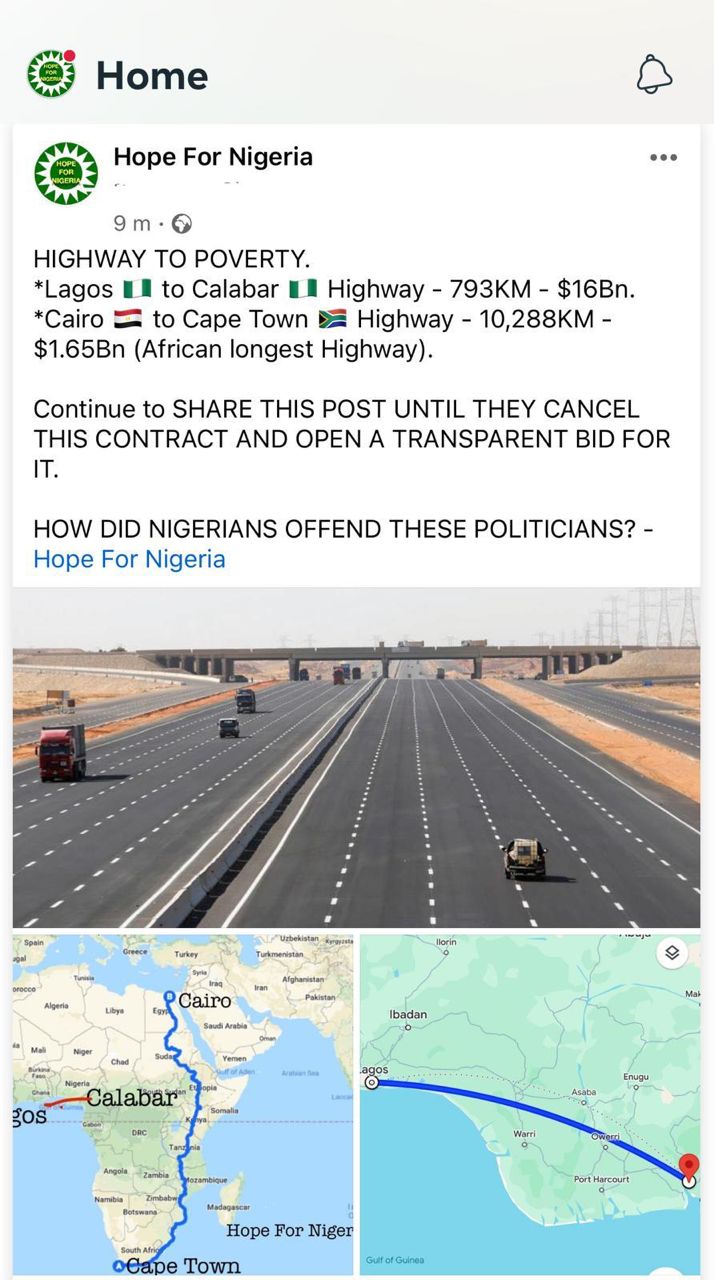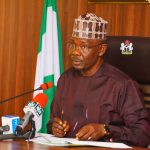Minister confirms upfront payments to Hitech Construction on a no- bid contract for ‘Africa’s biggest road’
The international rehabilitation of billionaire businessman Gilbert Chagoury had seemed complete. Once convicted in Geneva for laundering money stolen by military leader Sani Abacha and in the United States for illegal political contributions, these days Chagoury is feted by France’s President Emmanuel Macron and ex-US President Bill Clinton, and most of all by Nigeria’s Bola Ahmed Tinubu, as a philanthropist (AC Vol 65 No 13, Tinubu summons the ghosts of Abacha’s kleptocracy).
Three decades ago, Tinubu earned his spurs as a pro-democracy activist by joining the campaign against Abacha’s military regime. One of the most repressive in Nigeria’s history, the Abacha junta is reckoned to have stolen over US$4 billion of public funds from 1993-98.
Then, Chagoury, whose construction conglomerate had won a string of no-bid public works contracts, was styled as Abacha’s financial advisor. Today, after a lengthy rapprochement, Chagoury has re-emerged as Tinubu’s most important unofficial aide (Dispatches 1/6/23, New President ends fuel subsidy). He was described as conseiller personnel to President Tinubu in Nigeria’s delegation to the UN Climate summit in Dubai in November.
A leading donor to Tinubu’s 2023 presidential campaign, Chagoury is now the target of questions about the 700-kilometre Lagos to Calabar Coastal Highway project. The Hitech Construction Company, owned by the Chagoury family, has been awarded the contract as a public-private partnership.
In 2016, President Muhammadu Buhari’s government administration signed a memorandum of understanding with the China Civil Engineering Construction Corporation (CCECC) for the highway project, costed at $11.12bn. But the sides couldn’t reach agreement on a financing package.
Officials say Hitech is expected to raise the bulk of the project finance in exchange for a 20-year lease on the road which would yield substantial revenues from tollgates on the route. It will pass through nine states and include a railway alongside.
But civic activists are railing at the lack of transparency on the project, warning it could become another costly ‘highway to nowhere’. They point to road projects in south-west Nigeria that Hitech has failed to complete.
Atiku Abubakar, People’s Democratic Party presidential candidate, is asking about the cost of the financing as pressure mounts on the national budget. Officials in Abuja say the contract was awarded to Hitech without any competitive tendering or international benchmarking. And companies such as the Lagos-based Landmark Group are seeking compensation from the federal government for losses caused by the highway.
Minister of Works Dave Umahi has confirmed that Hitech has been paid 1.067 trillion naira ($809.4m) to start work on the first 45km section of the highway heading east from Lagos. Flanked by representatives of Hitech, Umahi said the project would boost interconnectivity across the country, calling it the biggest road project in Africa.
The coastal highway is to run from Lagos in the south-west to Calabar in the Niger Delta. Hitech says the highway will be built with 11-inch-thick concrete with tollgates at strategic points.
‘Any section that we complete, we will toll it and then business and transportation will start,’ said Umahi, adding that the project was conceived by President Tinubu. A consultant for Hitech, Nicholas Rizk, said the road would start in Victoria Island near Eko Atlantic City, then along the Lekki Coastal Road, to Lekki Free Trade Zone and the Dangote Refinery to link Ogun, Ondo, Delta and Edo, to reach Calabar.
‘It connects with the federal roads going from Lagos to Sokoto; from Warri to Kaduna, from Port Harcourt to Kano-Maiduguri and from Calabar to Maiduguri,’ said Rizk.
The core question is financial sustainability. Officials say Chagoury and Tinubu are planning to use a financing model used for toll roads in Lagos State. Hitech is to raise most of the finance upfront, backed by the government. The project would qualify for tax breaks and import waivers. Hitech would get exclusive rights to collect tolls and other fees along the road for at least 20 years.
‘This was what Tinubu did with the Lekki-Epe Expressway back in 2008… [when] ARM (the Asset and Resource Management company) and Hitech, were given 30 years to collect tolls before the deal was revised,’ said an aide to Tinubu.
Nigerian law mandates that all government spending and projects be approved by the National Assembly. Mooted by previous governments but rejected for lack of finance, the award for the Lagos-Calabar highway contract has not been debated by the Assembly or its Appropriation Committee. We understand that state financing for the first section of the road has been allocated from a special fund of N4trn controlled by the executive, after getting pro-forma approval from the Assembly.
The Infrastructure Concession Regulatory Commission (ICRC), which regulates private-public contracts, mandates the government to advertise all proposed projects so that interested contractors can submit bids. The Federal Executive Council, cabinet ministers and President Tinubu, would make the final decision.
‘The government announced Chagoury as the preferred contractor. Tinubu has made up his mind and any other action would just be a formality,’ said an official in Abuja who wished to remain anonymous.
Chagoury’s construction companies have thrived on state patronage and rival the history of Germany’s Julius Berger as a leading government contractor. The National Assembly complex, the headquarters of the federal civil service, the headquarters of the State Security Service and other key public installations in Abuja and Lagos were built by Chagoury’s companies (AC Vol 54 No 5, Eko Atlantic arises from the sea bed).
That position was built by the relentless courting of local and international politicians and corporations (AC Vol 50 No 24, Rogues and rackets on trial).
The close Tinubu-Chagoury relationship is just the latest example. When asked why Tinubu values Chagoury so highly, an Abuja official said: ‘He’s the point man for TotalEnergies in Nigeria – and both sides think he can deliver.’
TINUBU’S FRENCH CONNECTION
President Bola Ahmed Tinubu’s relationship with Gilbert Chagoury started on a chilly note after the demise of General Sani Abacha in June 1998. Chagoury had served as consigliere to Abacha and discreetly left Nigeria after the leader’s demise and subsequent regime change (AC Vol 45 No 13, Gas leak & AC Vol 47 No 2, The Sino-Shango pact).
The incoming civilian government under President Olusegun Obasanjo ordered all high- value contracts approved by Abacha to be investigated and any stolen funds to be repatriated to Nigeria (AC Vol 40 No 12, All hail to the chief).
After Tinubu won the governorship of Lagos state in the 1999 elections, he started reviewing the sale of government assets by the previous military regime in the state. The probe examined Chagoury’s ownership of the storied Eko Hotel on Victoria Island.
Until 1997, Lagos State Government owned 51% of shares in the hotel; Chagoury owned the remaining 49%. That year, Colonel Mohammed Buba Marwa, the Lagos military governor, sold another 26% of the state government’s equity in the hotel in an opaque deal with Chagoury.
As elected governor, Tinubu set up a tribunal of inquiry into the sale and acquisition of the hotel, subsequently ordering its reversal. Then Chagoury challenged the decision and won a judgement at the Supreme Court in 2006.
The two men – the pro-democracy campaigner and the consigliere to the junta leader – put aside their differences and went into business together. In one of their first big contracts, Tinubu commissioned Chagoury’s Hitech Construction was to upgrade the 50-kilometre Lekki-Epe Expressway on the Build, Operate, Own and Transfer principle. The African Development Bank provided US$85 million of the finance.
The improved road was to be commercially owned for 30 years by the Lekki Concession Company, in which Hitech has a stake, which collects tolls on what is effectively a private monopoly road as there is no alternative route.
When the Lagos State Government wanted to moderate the ocean surge along Victoria Island, it awarded the project to South Energyx Nigeria, a subsidiary of the Chagoury Group run by Chagoury’s younger brother, Ronald. South Energyx Nigeria was commissioned to take on the landfill and reclamation, then build a new city known as Eko Atlantic. With pretensions to becoming Nigeria’s Dubai, this city is now the most expensive real estate in West Africa.
Tinubu, known as the godfather of Lagos politics, both invests in and promotes Eko Atlantic City. The project has come to symbolise his ties to Chagoury (AC Vol 54 No 5, Eko Atlantic arises from the sea bed).
‘Both men are survivors, adapters and tireless network builders. They are a natural pairing given their long track record of deal making in and around Nigeria’s economic powerhouse,’ says Matthew Page, a former US national intelligence official and associate at the Chatham House think-tank in London.
The two kept in close, but more discreet, contact after Tinubu’s term as Lagos governor ended and he turned his attention to national politics. Chagoury also widened his network to include President Goodluck Jonathan of the People’s Democratic Party. He failed to charm President Muhammadu Buhari, who was vehemently sceptical about big business.
But the Tinubu-Chagoury axis endured. And when Tinubu told friends in 2022 that he was going to run for presidency on the ticket of the ruling All Progressives Congress (APC), he sought out Chagoury for advice.
As soon as he won the APC’s nomination in June 2022, Tinubu left for Paris for what his press officer called an ‘important meeting’. Pictures emerged of his meeting with Chagoury in the French capital, where insiders say they discussed picking a running mate and campaign finance tactics.
Tinubu flew to Paris again immediately after his Presidential election victory in February 2023, staying there for a month planning his transition programme.
Chagoury’s role was acknowledged by Tinubu in a fulsome birthday tribute in January 2023 calling him a ‘valued and treasured person’ who was ‘generous with his heart and resources’.
Living mostly in Paris, Chagoury was welcomed to Tinubu’s inauguration last May. Tinubu’s first trip as President was to Paris to see Chagoury and attend President Emmanuel Macron’s Global Finance summit in June.
Chagoury, who has sponsored the Gallery Gilbert et Rose Marie Chagoury in the Louvre, plays a leading role in Macron’s circle of African businesspeople. He also financed a cultural extravaganza at Macron’s Africa-France summit at Montpelier in 2021.
HOW CHAGOURY RETURNED TO PRIME TIME IN ABUJA
For much of the past decade, billionaire businessman Gilbert Chagoury kept a low profile in Nigeria. But the victory of his friend and business partner, Bola Ahmed Tinubu, in last year’s presidential elections brought him back centre stage. Under the Tinubu government, Chagoury is seen as the most influential of the President’s unofficial advisors. And it is clear that Tinubu has long dropped his concerns about working with associates of the country’s last military ruler, General Sani Abacha.
On 6 June 1998, just hours after Abacha’s sudden death, Chagoury placed a call to United States officials from his private jet (AC Vol 39 No 12, A cardiac coup). He told them he was talking to the Provisional Ruling Council which would be picking Abacha’s successor.
According to a State Department memo, Chagoury asked the US officials what type of government they wanted to see in Nigeria. Having won contracts in every sector of the economy – oil, gas, construction and agriculture – under Abacha’s military regime, Chagoury portrayed himself as man of the highest influence in Nigeria’s ruling circles.
He told court hearings about his confidential assignments for Abacha and that his company was tasked equipping and training the presidential guard. But his connections to the federal government weakened under the presidency of Olusegun Obasanjo.
National Security Advisor General Aliyu Mohammed Gusau was ordered by Obasanjo to open negotiations with all of Abacha’s financial associates for the repatriation of state resources. Gusau coordinated closely with the British and US intelligence services (AC Vol 40 No 23, Presidential accounts). A US Justice Department file referred to Abacha as ‘one of the most notorious kleptocrats in memory who embezzled billions from the people of Nigeria’. The DoJ froze US$458 million of stolen funds from Nigeria in 2014, some of which has been repatriated under the World Bank’s asset recovery programme.
Enrico Monfrini of the Geneva-based law firm and asset-tracing specialists Monfrini Crettol & Associes tracked down hundreds of millions of dollars of Nigerian funds stolen during the Abacha regime and hidden in Swiss financial institutions (AC Vol 41 No 21, High street havens).
In 2000, a Geneva court convicted Chagoury of laundering funds stolen by Abacha, according to court records. Chagoury insisted he was unaware that the funds were stolen but paid a fine of a million Swiss Francs (US$600,000 in 2000).
Four years earlier, Chagoury, who owns a substantial villa in the Hollywood district of Los Angeles, donated $460,000 to the Democratic Party in the US, attending a fund-raising dinner with President Bill Clinton. He subsequently became one of the biggest donors to the Clinton Foundation.
A long-running case in which Chagoury (as a foreign national) was accused of making illegal political donations to US politicians was resolved when he paid a $1.8m fine in 2019.
When Hillary Clinton was Secretary of State (2009-13), Eko Atlantic city, built on reclaimed land adjacent to the wealthy suburb of Victoria Island, was identified as a location for a US consulate in Lagos. The development is jointly owned by Chagoury’s Hitech Construction and companies linked to President Tinubu, who has been the loudest cheerleader for the project.
After Hillary Clinton left office, the State Department agreed that its new consulate in Lagos, its biggest in the world, would take up the anchor tenant site at Eko Atlantic City and convened a ground-breaking ceremony.
Washington is spending $537m on the consulate, which is due to open in 2027, despite criticisms from anti-corruption campaigners. Matthew Page, a former State Department official and Associate Fellow at London’s Chatham House think-tank, told Bloomberg News, ‘Either the US government was incompetent and didn’t do due diligence or understood who it was dealing with and disregarded the obvious concerns.’
Source: Africa Confidential






